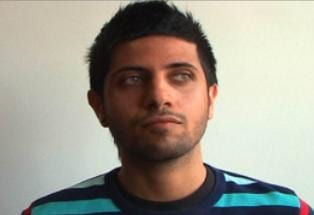Most critiques of Facebook and other social media focus on the decaying (if not now non-existent) wall between public and private. But Beirut-born, Montreal-based artist Ali El-Darsa is more concerned about what all this tweeting is doing to the way we process information.
“It’s a constant overload of stimuli,” he says. “We are consuming more and more information at a faster and faster pace, but we’re retaining little of it.”
In the rush to share our lives, he notes, we are proving Marshall McLuhan’s predictions that new media will eradicate both time and distance. And we’re all still adjusting to the “global village” we’re creating.
As part of Free Fall, an eight-day national performance art festival, El-Darsa is bringing his new piece, That tree you claimed your throne, to the Drake Lab on March 26 and 27. Packed into a 15-minute performance are months worth of the artist’s text messages, broadcast aloud while his own voice is recorded on stage and mixed into the playback, creating a vocal interaction between past and present.
“I’m trying to interact with the content,” he says, while showing how that content loses meaning over time, even in the space of minutes. This occurs as his recorded voice and old texts are fed back to him and the audience as rhythms, thanks to help from multimedia software programmers Johann Baron Lanteigne and Julian Stein. Each “ephemeral performance” at the Drake Lab will be unique, El-Darsa says, “a structure of randomness” to challenge the artist and audience alike.
“I wanted to bring them into a private sphere,” he says of the audience. Any discomfort he might feel in exposing private communications becomes part of the theme: the construction of new images of self through social media and the sense of dislocation this can create.
For El-Darsa, who emigrated to Canada from Lebanon a decade ago, that sense was acute, and it is a theme that has come up in several of the short films he’s had shown at Inside Out and other film fests, from Berlin to Brooklyn.
As with anyone who has moved from one country to another, El-Darsa went through a process of remaking himself. “Beirut is very queer-friendly,” he says, “but the law hasn’t been reformed.” He says Montreal became a place of new freedoms, both personal and artistic, and he became fascinated with using technology as a creative medium.
This piece, El-Darsa says, is as much a meditation on home. “We’re all looking for one,” he says, “but is it a place? Is it based on memories?”
Memories fade, but so, too, do the technological means we use to record them. Our texts, tweets, stories and even facts, he says, “lose their essence and importance over time.”
The Deets:
The tree you claimed your throne
Free Fall Festival
March 26, 7pm & 8:30pm
March 27, 7pm & 9:30pm
The Drake Lab
1142 Queen St W


 Why you can trust Xtra
Why you can trust Xtra


